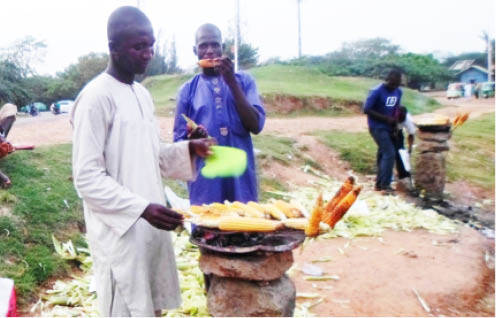Wuye Junction: Abuja’s fresh maize hub
Wuye Junction, off Berger, Area One Expressway, appears to be Abuja’s hub for roasted fresh maize. Our reporter observed that both the high and the low usually stop over at the junction to buy some cobs of the roasted maize to savour, especially while returning from work. Some of the young men who are into […]


Wuye Junction, off Berger, Area One Expressway, appears to be Abuja’s hub for roasted fresh maize.
Our reporter observed that both the high and the low usually stop over at the junction to buy some cobs of the roasted maize to savour, especially while returning from work.
Some of the young men who are into the business told our reporter that they made reasonable profit from the trade.
Ahmadu Tijjani said he had been sourcing, roasting and selling the commodity for 10 years in Abuja. He said he started when he learnt that the demand for roasted maize was more than that of fruits, which he sold initially.
He said they used their handsets to source for the produce from satellite towns in the FCT and environs like Gada Biyu in Abaji, Masaka Market in Nasarawa State, Dikko Market; Suleja and in Sabon Wuse on the Abuja-Kaduna Expressway, all in Niger State.
“We have surplus of the maize during the rainy season, but during the dry season, we buy a section or a whole farm from irrigation farmers for prices ranging from N20, 000 to N25, 000. We go at dawn to pluck and gather the maize, then hire a car to take it to the selling point,” he said.
He explained that their patronage was increasing day by day because they ensured their customers got served with fresh maize, adding that they only roasted the ones they plucked same day.
He said he sold one and half bags of maize daily when patronage was good and one bag at weekends.
He further said a bag of maize cost N4, 500 during the rainy season while the price went up in the dry season.
Tijjani said the trade was profitable but that the heat from the charcoal fire was a challenge.
He said he married, had three children and built a house in his village from the proceeds of the business.
Another trader, Malam Sadanu Bala Kusada, said, “I have been selling roasted maize for 12 years in this same spot. I married, built a local house in my village, bought a farm of N300,000 and two plots, and I have been taking care of my wife, son and aged parents from the proceeds. But because the heat has been disturbing me, I want to switch from roasting maize to start trading in ladies’ wears in a shop.”
The maize hawkers said they were also employers of labour as they hired helping hands who fanned the charcoal and delivered roasted cobs to waiting customers and run other errands, stressing that if one did not have a helping hand, the maize would burn in the process of roasting and delivering to customers.
They expressed gratitude to an anonymous woman who they said saved them when law enforcement agents came to arrest them for constituting public nuisance.
